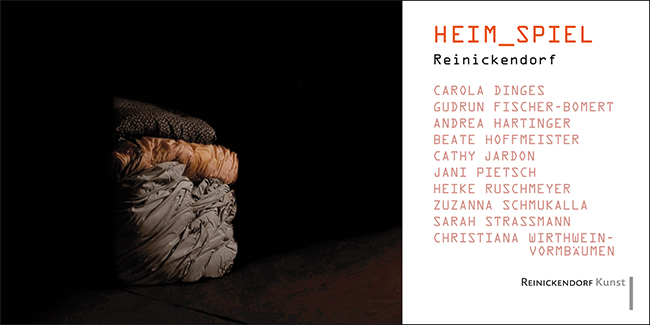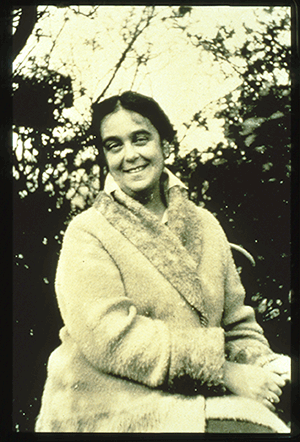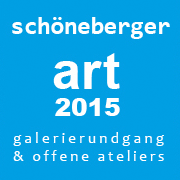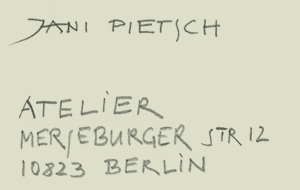E X H I B I T I O N S
![]()
![]()
![]()
H E I M__S P I E L ![]() R E I N I C K E N D O R F
R E I N I C K E N D O R F![]()
![]()

![]()
Frauenmuseum Berlin
zu Gast in der GalerieEtage
im Museum Reinickendorf
Alt-Hermsdorf 35
13467 Berlin
Opening | 25. Februar | 7pm
25. February - 29. Mai 2016
Monday-Friday, Sunday 9am - 5pm
Admission free
www.museum-reinickendorf.de
www.frauenmuseumberlin.de
LOCKED OUT OF EUROPE
Video Installation | 2014 | 15 min
Pope Francis calls it the globalization of indifference. We are the travellers of permanent transit, say the refugees.
The European Union is a house with 28 open doors. We Europeans are pleased at this newly acquired freedom and peace and the possibility of living and working in whatever area of Europe we choose.
The doors of Europe are locked tight on the outside, especially southwards. Europe’s furthest southern border is not on European soil but in Africa. Melilla, a Spanish exclave in Morocco with approx. 80 000 inhabitants, is so far away from Europe and our peaceful existence that we fail to see what is happening at this, our external border.
Melilla was fenced in with funds from the European Community. The border system is eleven kilometres long and consists of three consecutive fences, one of which is six metres high. Floodlights, movement detectors, thermal cameras, watchtowers and patrol vehicles are reminiscent of the inner-German border. Very few attempts to scale the fence succeed. Migrants and refugees from Sub-Saharan Africa are injured by NATO razor wire or by border guards. Lacerated, they drop to the ground and, without receiving medical assistance, are frequently deported back to Morocco on the spot.
Jani Pietsch explored the fence on foot and by bicycle. Her collage of video and sound recordings translocates Europe's most southern border to the centre of Europe.
![]()
![]()
![]()
K Ä T H E![]() L O E W E N T H A L – Film, Reading and Discussion
L O E W E N T H A L – Film, Reading and Discussion
![]()

![]()
The Jewish painter Käthe Loewenthal was born in Berlin in 1877 and grew up in Geneva, Lausanne, Paris, Berlin, Bern, and Argentina.
Having completed a wide range of artistic studies begun in 1895, she worked as an artist from 1914 until her death, earning her living by painting portraits.
In 1933 she was banned from painting and exhibiting. Forced in 1941 to live in a so-called Jewish house, she was placed in a collection point in Weißenstein in 1942. From there she was deported to the Izbica transit camp near Lublin in Poland, where she was murdered.
SCREENING | Saturday | November 14 | 6 pm
The film Käthe Löwenthal (1877-1942) produced by the Verein Lebenswerk Käthe Loewenthal e.V. will be shown. A public discussion will be held after the film in the company of Professor Wolf Ritscher, who never had the opportunity of meeting his great aunt, Käthe Loewenthal, personally. The discussion will be presented by Jani Pietsch.
READING | Sunday | November 15 | 5 pm
Author Jani Pietsch will read the chapter Karriere geht vor (career has priority) from her book Ich besaß einen Garten in Schöneiche bei Berlin. Das verwaltete Verschwinden jüdischer Nachbarn und ihre schwierige Rückkehr. The chapter deals with the divorce of Susanne Ritscher, née Loewenthal, and her non-Jewish husband in the interests of his career. Marie Rolshoven will present the discussion following the reading, a conversation between Jani Pietsch and Wolf Ritscher, Susanne Ritscher-Loewenthal’s grandson.
REGISTRATION jani.pietsch@gmail.com
Admission to all events is free!
VENUE
Atelier Merseburger Str. 12
10823 Berlin-Schöneberg
U7 | Eisenacherstrasse
S1 | Julius-Leber-Brücke
These events are the result of cooperation between Bildungswerk Berlin der Heinrich-Böll-Stiftung and KUBIN and are funded by the Stiftung Klassenlotterie Berlin.
![]()
![]()
![]()
S C H Ö N E B E R G E R![]() A R T
A R T![]() 2 0 1 5
2 0 1 5
![]()

TWO INSTALLATIONS BY JANI PIETSCH, MARIE ROLSHOVEN + FLORIAN VOSS
An exhibition addresses the fatalities that occurred at the German-German border. Marie Rolshoven and Florian Voß’s light installation focuses on victims of the Berlin Wall.
The past is linked here to the tragic circumstances of today’s refugees at the borders of Europe. Pope Francis calls it the globalization of indifference. We are the travellers of permanent transit, say the refugees.
Jani Pietsch explored the fence between Morocco and the Spanish Exclave Melilla on foot and by bicycle. Her collage of video and sound recordings translocates Europe’s most southern border to the centre of Europe.
Saturday | November 7 | 2-8 pm
Sunday | November 8 | 12 am - 6 pm
![]()
![]()
![]()
